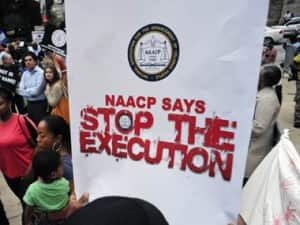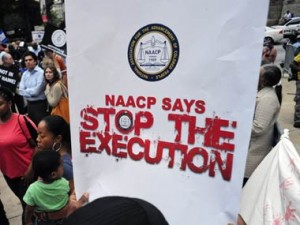The Supreme Court Wednesday commuted the death penalty awarded to Mahendra Nath Das who was convicted for two murders and whose mercy petition had been rejected by the president. A bench headed by Justice GS Singhvi allowed the plea of Das who had approached the apex court for commutation of his death sentence on the ground that the President had taken eleven years to decide his mercy plea. Das was held guilty of the murder of Ranjan Das in 1990 in Assam. Six years later, he murdered Hara Kanta Das while on bail. [caption id=“attachment_743505” align=“alignleft” width=“380”]  Representational picture. Reuters[/caption]
According to a report by The Telegraph, Mahendra Nath Das, who was 33 then, beheaded the 68-year-old Hara Kanta Das at Fancy Bazar, Guwahati on April 24, 1996. The court records of the case say that Das hit him with ‘a sword like weapon’ and later amputated the right hand and severed his head.
“With the head of the deceased in one hand and the blood-dripping weapon in the other, he moved majestically towards Fancy Bazar police outpost…” the records read.
Amal Das, son of the slain Hara Kanta Das, believes that his father was killed because he stood up to the accused. In an interview to DNA, he says, “My father owned couple of vehicles and was the secretary of the All Assam Truck Owners’ Association. Mahendra held the same position in a transporters’ union. He used to demand exorbitant amounts as fee from truck drivers. My father spoke up against this and was killed. Since he got away with his earlier murder, it encouraged him to commit the murder of my father as well.”
A businessman, Amal added that Das was a hardened criminal. Even after killing Ranjan Das, in 1995, he went scot-free as the police failed to file a charge-sheet against him within the stipulated 90 days.
Ranjan Das was the Secretary of the Assam Motor Workers Union, from which Mahendra was reportedly expelled. A trial court sentenced Das to life imprisonment. He was granted bail during the pendency of the trial, the same time he killed Hara Kanta Das.
After the twin murders, Das was sentenced to death by the Sessions Judge, Kamrup (Guwahati) in 1997. The death sentence was confirmed by the HC in 1998 and the SC upheld the death sentence in 1999. A mercy petition that Das had filed before the then President Pratibha Patil in 1999, was rejected in 2011, after a delay of 11 years. A Hindu report says that Das in his petition had contended that the delay in giving the assent for the death sentence had resulted in excruciating agony and trauma for 11 years and this was a valid ground for commuting the sentence. Even after his fate was sealed, Das’ hanging was further delayed as the authorities of Jorhat Central Jail in Assam failed to find a hangman. Waiting for a hangman for 17 years, Mahendra then launched a “Gandhian” fast-unto-death in the jail, demanding abolition of capital punishment, according to a report by The Indian Express. There have been protests against the conviction of Mahendra and even Amnesty International had not only expressed concern over Mahendra’s imminent execution but slammed the government on awarding death penalty. With Agency Inputs


)

)
)
)
)
)
)
)
)



